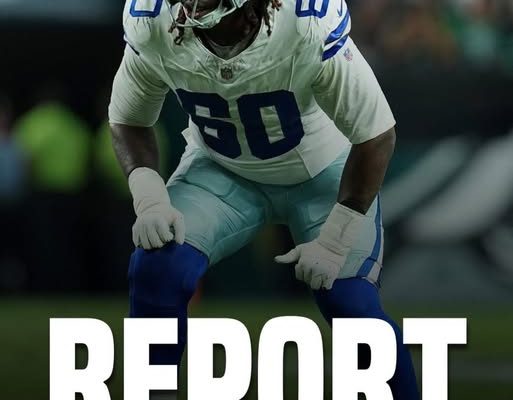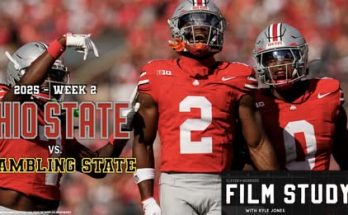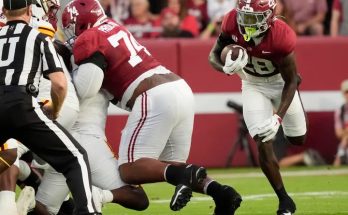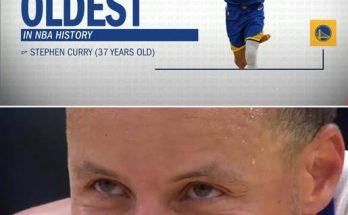The Dallas Cowboys found themselves in the headlines following their season-opening Kickoff game against the Philadelphia Eagles, not just for the action on the field, but for what has unfolded afterward. According to Cowboys reporter Patrik Walker, rookie left tackle Tyler Guyton has been fined \$12,172 by the NFL for punching Eagles outside linebacker Jalyx Hunt in the head during the contest. The surprising part of the situation is that the play was not flagged during the game, and officials let it go in real time. However, league discipline has a way of finding moments missed on the field, and now Guyton will have to face the repercussions. He does not intend to take the fine quietly, though, as reports indicate he plans to appeal the punishment handed down by the league office. This incident, relatively minor compared to some of the more egregious personal fouls in the NFL’s past, has nonetheless opened discussion about enforcement, officiating, and the always-intense rivalry between the Cowboys and Eagles.
Tyler Guyton, a highly touted rookie out of Oklahoma who earned the starting left tackle role for the Cowboys, was making his NFL debut on one of the biggest stages possible, the nationally televised season opener against a divisional rival. The pressure was already immense, as Cowboys fans and analysts alike were eager to see how the young lineman would hold up against one of the NFL’s most aggressive defensive fronts. The Eagles pride themselves on their pass rush depth, and Guyton was lined up opposite hungry veterans and athletic rookies all night long. The fact that the altercation happened against Jalyx Hunt, another rookie making his mark, added an interesting twist. Hunt, a standout in training camp, had been trying to assert himself as part of Philadelphia’s rotation. In a clash that epitomized the intensity of the rivalry, emotions boiled over.
The actual incident wasn’t initially spotlighted by broadcasters or officials. On the play in question, Guyton was engaged with Hunt during a protection sequence. After some pushing and shoving, Guyton appeared to take a swing, making contact with Hunt’s helmet. From most angles, it looked like a heated but isolated exchange, the type of thing that happens in the trenches on nearly every snap. The referees kept the flags in their pockets, perhaps believing the two players were equally guilty of extracurricular activity or that the incident didn’t rise to the level of an unsportsmanlike conduct penalty. But upon review by the league office, the tape showed enough to warrant a fine.
The NFL’s disciplinary process has long worked independently of in-game officiating. Plays that go unnoticed by referees are often revisited by the league, and players can be fined for actions that violate the rules even if no penalty was assessed on the field. This is part of the league’s effort to maintain control and discourage unnecessary roughness. For Guyton, the \$12,172 fine is the standard amount under the NFL’s schedule of fines for a first offense of striking an opponent. For context, fines escalate with repeated violations or more severe acts, but the league generally sticks to its predetermined schedule. Guyton’s decision to appeal suggests he believes there is either justification for his actions or that the punishment does not fit the context.
Appeals of fines are not uncommon, particularly for rookie players who may feel that officials did not adequately assess the situation. Offensive linemen often argue that defenders provoke them with late hits, trash talk, or physical grabs after the whistle. In Guyton’s case, he may claim that Hunt’s actions in the play contributed to his reaction, or that the contact he made was incidental rather than intentional. Appeals are reviewed by a neutral arbitrator, and while fines are sometimes reduced, they are rarely overturned entirely. Still, the appeal process allows players to voice their side and potentially save a portion of their paycheck. For Guyton, the fine represents a small dent in his earnings as a first-round pick, but it is still a financial penalty he would rather avoid.
This situation also highlights the microscope under which the Cowboys operate. As one of the league’s most scrutinized franchises, every action on or off the field becomes magnified. For a rookie like Guyton, his debut being remembered not just for his performance but for a disciplinary fine is an unfortunate twist. Yet it also underscores the kind of fire he brings to the game. Cowboys fans often demand toughness from their offensive line, and while no coach will endorse punching an opponent, they will acknowledge the edge it shows. Dallas has long prided itself on having a physical identity in the trenches, and Guyton may have simply been caught in the emotions of the rivalry.
On the flip side, the Eagles and their fans will no doubt use this as fodder to paint the Cowboys as undisciplined. Rivalries in the NFL thrive on these narratives, and any incident becomes part of the folklore. Just as Eagles fans point to moments like Michael Irvin’s injuries in the 90s or DeMarco Murray’s fumble in 2014, this punch will live in the archives of the rivalry, even if relatively minor. It adds another wrinkle to the decades-long tension between two of the most passionate fanbases in the league. When the teams meet again later in the season, expect Hunt and Guyton to be matched up once more, and every snap between them will carry that extra layer of drama.
Beyond the rivalry angle, the league’s handling of the situation opens up questions about officiating consistency. How did a punch to the head, something officials are specifically trained to penalize, get missed during the game? Was it a failure of positioning by referees, or did they see it and simply choose to let the players handle it themselves? The NFL has been pushing for years to clean up unnecessary violence, particularly shots to the head, given the emphasis on player safety and concussion awareness. To have an act like this slip by in such a high-profile game invites criticism. Fans will wonder why the fine came only after the fact, and whether the Eagles lost out on a potential 15-yard penalty that could have changed field position or momentum.
For Guyton personally, the fine could be a learning experience. NFL veterans often say that the biggest adjustment for rookies isn’t just the speed of the game, but the ability to control emotions under the spotlight. In college, an outburst might be overlooked or even celebrated by teammates. In the pros, with cameras capturing every angle, the stakes are higher. Offensive linemen have to walk a fine line between aggression and discipline. Guyton will need to channel his intensity into blocks and pancakes rather than extracurricular blows. The Cowboys coaching staff will likely sit him down to stress this balance, reminding him that protecting the quarterback matters more than proving a point to a defender.
Cowboys fans, meanwhile, will watch this story unfold with the usual mix of concern and defiance. Many will argue that the NFL is targeting their team unfairly, a common refrain whenever Dallas players are disciplined. Others will shrug it off as part of the growing pains for a rookie lineman. What matters most to them is how Guyton performs moving forward, particularly against other elite pass rushers. If he protects Dak Prescott’s blind side effectively, fans will quickly forgive a hot-headed moment. But if he continues to draw fines or penalties, questions will arise about his maturity and composure.
As for Hunt, the Eagles linebacker finds himself in a unique position as well. Being punched in the head during your debut is not exactly the welcome-to-the-league moment most players dream of, but it does show the level of intensity he commands from opponents. If he continues to push offensive linemen to their limits, he will carve out a reputation as a relentless edge rusher. In that sense, Hunt may benefit from the publicity. He becomes part of the story not just as a rookie contributor, but as a player who already frustrates division rivals.
The appeal process will play out quietly in the background, but the real test comes on the field in the weeks ahead. How Guyton responds will shape not only his reputation but also the Cowboys’ trust in him as a foundational piece of their offensive line. The fine itself, while notable, is just one chapter in a much larger story about a rookie entering the NFL spotlight. It demonstrates how every action, even those missed in the moment, can come back under review. It also emphasizes the NFL’s commitment to policing behavior, even retroactively.
Ultimately, Tyler Guyton’s fine for punching Jalyx Hunt is a reminder of the thin line between intensity and recklessness in professional football. It shows the challenges rookies face in adapting to the spotlight, the way rivalries fuel emotions, and the power of the league office to intervene after the fact. For the Cowboys, it is both a minor distraction and a teaching moment. For the Eagles, it becomes a rallying point in their rivalry. For the NFL, it is business as usual, enforcing the code of conduct that underpins the game. And for fans, it adds one more spark to the fire of one of football’s greatest rivalries, setting the stage for future clashes where every snap is about more than just the ball—it’s about pride, toughness, and control.



